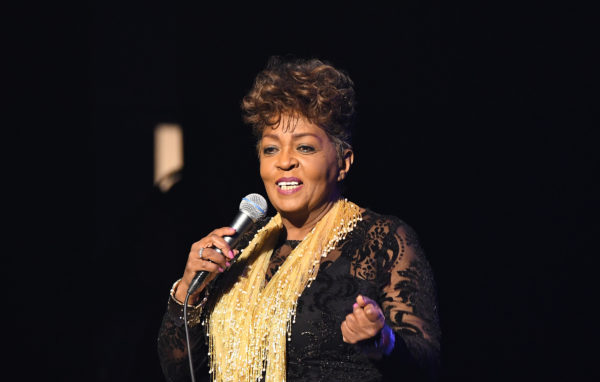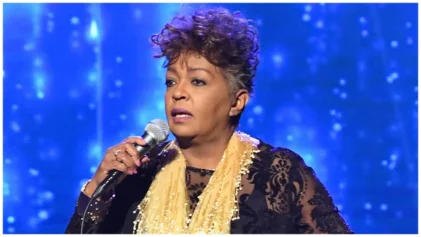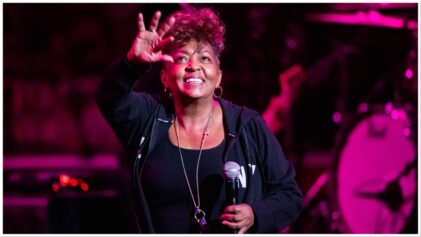Anita Baker has requested that her fans no longer stream or purchase her music. The legendary singer took to Twitter on March 9 to announce that she will request that the music copyrights revert back to her. However, Baker is prepared to have to fight executives for the deal, and in the meantime, does not want her listeners making them any more money.
“Miraculously… I have out-lived all of my artist’s contracts,” wrote Baker. “They no longer “own” my name and likeness. And, by law…30- year-old masters are to be returned to me. Unfortunately, they’re gonna make me fight for it. I’m prepared, to do that. Please don’t advertise/buy them.”

The guidelines for copyright reversion are set in Section 203 of the 1976 Copyright Act. Section 203 presents an opportunity for songwriters to dismiss their assignments and regain their copyrights, according to Song Writer Universe. For works created after January 1, 1978 “grants, assignments and licenses can be terminated during a five year window starting 35 years after such grant was made.”
Baker’s expectation to battle for her masters is not unfounded. Among other procedures, a letter must be composed appealing for the copyright to revert to the songwriter, and has to be sent no more than 10 years prior and no less than two years prior to the effective termination date.
Baker’s Twitter comments were primarily positive and supportive of the iconic performer, with Baker giving her fans a peek into why she was so adamant about owning her music in the first place.
It began when a user indicated that she had made a Spotify playlist devoted to Baker, who responded with a sincere thanks, as well as a warning about the music streaming behemoth.
“Hello sweetheart, thank you for sending me your love,” she posted. “But, let’s not advertise Spotify streaming, which is a publicly-traded company, with a 50 million valuation… but doesn’t pay artists/creators what they’re worth.”
She proceeded to give her fans some fundamentals about how Spotify compensates its artists. A commenter expressed doubt over how long streaming residuals actually were. “Can’t be that low that would mean 250k stream to make £1 (or $ whatever currency your using). I read it’s about 0.003,” they wrote.
In response, Baker wrote, “Excuse you… Most record contracts & distribution deals fractionalize pennies.”
She continued to explain in multiple tweets, explaining the reality that most musicians face when getting paid for streams.
“Yes… artist/creator’s royalty, based on fractionalized pennies. Distribution deal between record company and distributor/Itunes, etc. based on the dollar. 50/50 – 70/30… off the top… before the artist/creator, see their fractional penny.”
To visualize it further, Baker capped off her education session with the streaming rate from 2020, and her followers were shocked to see just how much streams are worth.
“2020 streaming rate, $0.003 – $0.005, 1/3rd – 1/2 a penny per stream, for artist. Minus…fees, taxes, ect. ect. ect. They need to leave me alone.”
Ultimately, Baker urged fans eager to help, to not advertise, buy, or stream her CDs, adding, “They don’t pay me anyway.”
Even so, like any multi-talented, enterprising artist, she is making sure she stays paid in other avenues. She mentioned to one user that she has a slate of projects in development, including a live concert video, a biography, and a bio-pic.
Becoming a successful musician can not only be monetarily fruitful, but expensive as well. For artists who are dependent on music sales, especially in a pandemic when they can’t tour, turning to other streams of revenue is necessitated.
When artists own their masters they have the legal rights to freely take them and capitalize on their financial opportunities. With a master recording, an artist can license the recording to third parties, like TV shows, films, commercials or even for sampling use by other artists.
A number of notable musicians, such as Stevie Wonder, Jay-Z, Beyonce, Rihanna, and LL Cool J, have claimed ownership of their masters, and more artists will surely follow suit, as artistic control becomes paramount in this era of the music industry.
Baker invoked Prince’s name in a couple of her Twitter posts, and the music icon has one of the most notorious cases of a prolonged legal battle with his label over artistic and financial control of his music. After an extended, greatly publicized dispute during which he began performing in protest using only a symbol as his name, he was finally released from his contract, with the incident serving as a notable instance of an artist’s triumph in defending his artistic beliefs and monetary recompense.
In the early ’60s, Ray Charles was one of the first Black music artists to obtain ownership of his own master recordings in a deal with ABC-Paramount, according to Black Enterprise. Decades later, in the ’90s, Master P became the first rapper to gain 100% ownership of his masters, and he founded his own label, No Limit Records, in 1990.


